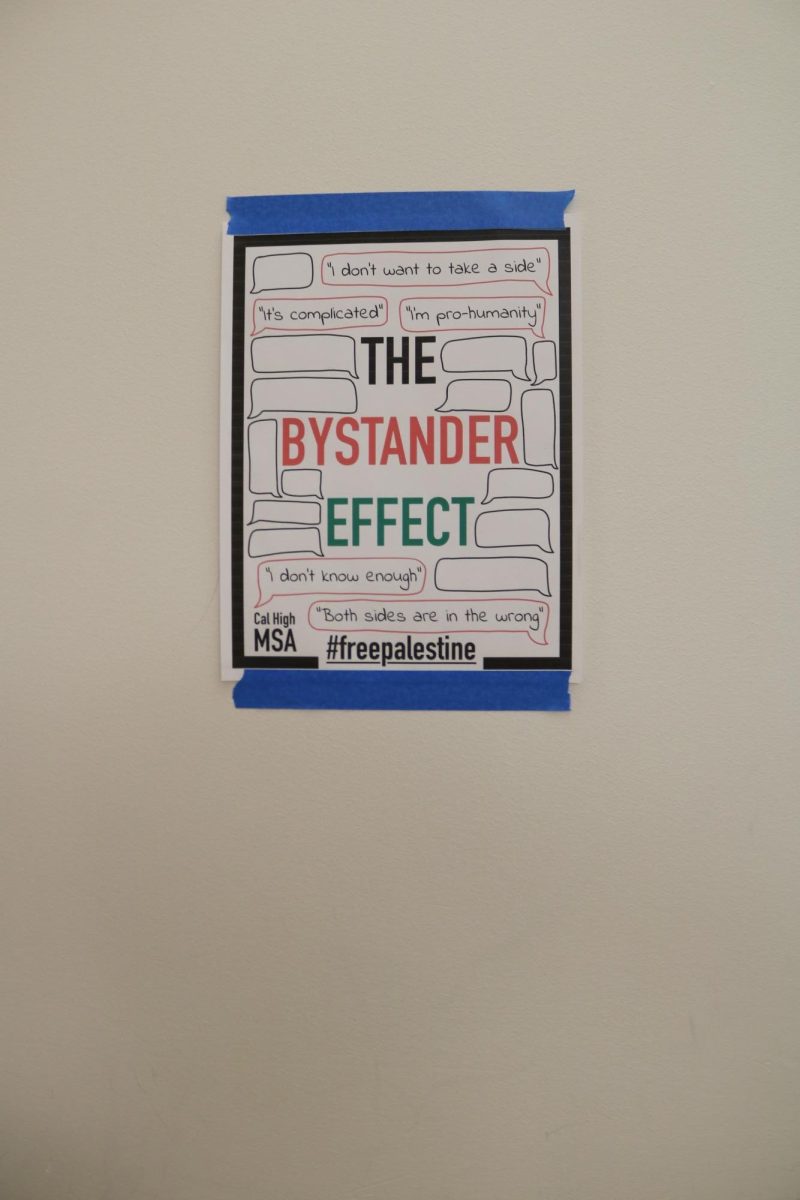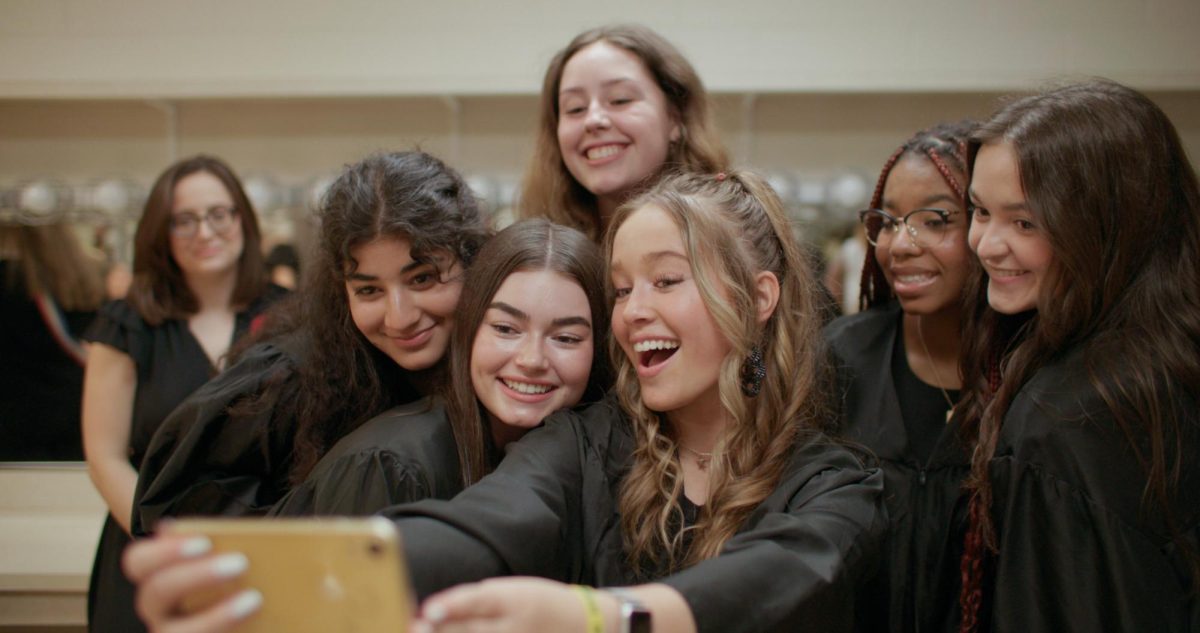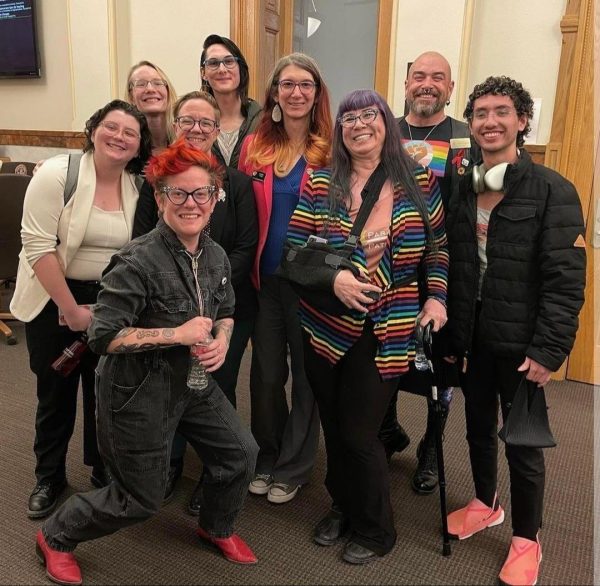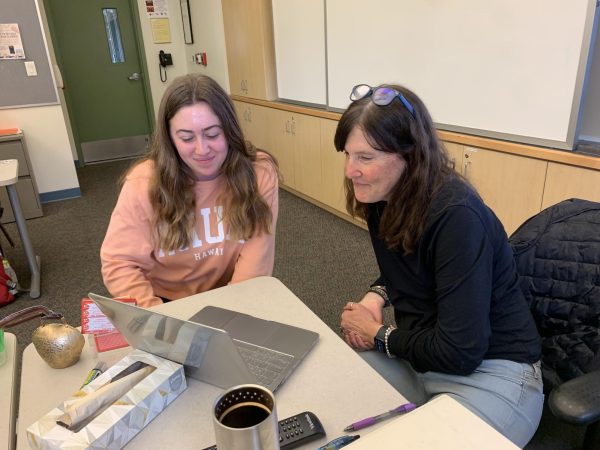Unlivable Wages
Learning Center intern Nino La Madrid works with a student. La Madrid has been with the Clayton School District for 14 years. Prior to working at CHS, LaMadrid was an actuary and a college math instructor. During his 14 years in the school district, LaMadrid’s 6,000 salary has remained largely unchanged.
December 16, 2021
I.
Every Thursday, Friday, Saturday and Sunday, for a year, Andrew Roberts would get off work at his job as an intern in the Learning Center at Clayton High School and go to St. Louis Lambert International Airport — but not to catch a flight. Instead, he would clock in at about 5pm to start a shift at his second job at Avis Car Rental, and would clock off at about 11pm.
“So for about a year, I didn’t have weekends or evenings,” Roberts said in an interview. “Social life was really an impossibility.” Roberts teaches humanities and general support classes in the Learning Center.
Now, Roberts drives for Lyft on his time off, but he says it’s awkward when he picks up a student. When that happens, Roberts said, “It’s like, ‘Oh, Mr. Roberts, you’re also driving for Lyft?’” He said he doesn’t think that students understand that, in his job at the high school, he doesn’t earn a livable wage.
Even still, Roberts borrows money from his parents. “Usually, every month, it’s often $200 to $300. Sometimes it’s been as high as $700,” said Roberts. “Going to your parents as a 30-plus-year-old for money, even if they do give it to you and say, ‘We support you’ and everything, it makes you feel like you’ve made really bad decisions.”
Massachusetts Institute of Technology’s Living Wage Calculator estimates that a single St. Louis County adult with no children has annual expenses of over $29,500 — $3,500 more than the Learning Center staff makes this school year. A single adult without children has the least expenses of any category on the calculator.
A single St. Louis County adult with no children has annual expenses of over $29,500 — $3,500 more than the Learning Center staff makes this school year.
Tony Arnold, the district’s assistant superintendent of human resources, said the concept of a livable wage was subjective because the wage depends on location and the number of adults and children in a household.
For a working couple with three children, those expenses top $110,000. Brenton Jamison, another Learning Center intern, is married with three kids, and he also works a second job “because of the salary I earn here,” he said.
“I should be able to leave here and then spend that quality time with my family. I’m not able to do that,” Jamison said. “The fact that I can’t spend time with my family because of the lack of pay is really what I struggle with most.”
When Justin Seiwell, now CHS’s video production teacher, teacher’s union representative and speech and debate coach, worked in the Learning Center 11 years ago, he struggled, even though he earned more than his counterparts. Seiwell worked half-time in the Learning Center, spending the other half teaching English classes for a teacher who suddenly needed a long-term substitute, and earned half of an intern’s salary plus half of a teacher’s salary.
Seiwell said when his car was stolen while working in the Learning Center, “I spent approximately a semester doing a one hour commute each way on the Metrolink because I couldn’t afford a car.” Seiwell noted, “I think the current interns that we have have it far worse than I did.”

The Learning Center serves as an instructional resource for students, mostly by providing individual and small group support and what its director, Carroll Lehnhoff-Bell, describes as “individualized support in a positive, academic environment where students feel at home,” through its classes.
English Department Chair Deana Tennill said that the program helps students generate ideas and plan essays for their English classes, which would otherwise take several conferences — time that English teachers with packed schedules don’t necessarily have.
Seiwell said that while the Learning Center interns are full-time employees of the school district, “[their] job objective can change depending on the needs of a day, a week, a month, a semester, a school year … That provides a real luxury to the school district to address acute needs as they come up.”
“They’re teaching executive functioning. It’s the hardest thing in the world to teach, how to have a kid figure out how to think for themselves,” Seiwell said of the Learning Center staff. “They’re doing the hardest teaching in the building.”
Students and parents concurred with teachers: “The Learning Center teachers have been pivotal in helping my children who are student athletes to learn time management, staying on track and [staying] focused,” said one parent, Kerry Vetter. “The Learning Center teachers have been essential in helping the freshman class that were not familiar with the rigorous expectation of CHS. The program continues to be extremely helpful for students who need the in-person and hands-on help to excel in school and participate with sports activities after school.”
The Learning Center teachers have been essential in helping the freshman class that were not familiar with the rigorous expectation of CHS.
— Kerry Vetter, CHS parent
“The Learning Center helped me with all my classes through the four years I’ve been in high school,” said Gabriella Broussard, a senior at CHS and her class’ president. “I built a very good relationship with Mrs. [Lehnhoff-Bell] and Mr. Jamison, who helped me battle tough college prep classes such as Algebra, Chemistry and English. Now that I am in my senior year, I still spend a lot of time in the Learning Center to get work done, such as college applications. Ms. Richards has been a big help with college essays, applying for scholarships or just being there for a hug on a rough day.”
Safari Sanders, another parent, said the Learning Center “has gone to great lengths to make sure all the students are learning, building strategies and communicating effectively, and they inform the parents of what works best for the students. Without the staff in the Learning Center department, many students would be suffering.”
Sanders, referring to district leadership, said, “I challenge you to make the necessary adjustments to our Learning Center teachers’ salaries, so we can keep the qualified and credentialed teachers that love their jobs and our students.”
In a district where almost 90 percent of teachers are paid over $60,000 a year, it’s anomalous that the Learning Center’s staff, who have an average of nine years’ service with the district, are paid only $26,000.

II.
Lehnhoff-Bell outlined a number of issues she identified with the interns’ current position: first, that the title of intern itself “doesn’t clearly define what it is that the Learning Center staff does.” She explained that the intern title in education typically refers to what the position originated as: a way for new teachers to “get their feet wet,” but that the position “definitely isn’t that anymore.”
“The … problematic thing with the title is, it keeps being compared to other positions in other districts when we talk about like, ‘Well, we pay our interns more than other districts,’” said Lehnhoff-Bell. “I have reached out to some of the surrounding districts who have intern/aide positions and the interns or aides in those districts do not have comparable responsibilities. We are proposing that we do away with interns to staff the Learning Center. The support students, families and teachers are looking for from the Learning Center is more of a coach or advisor type position, and I would love to see the Learning Center staff be paid a salary that matches their value and role.”
Arnold explained that when the district looks to change the pay for a position, they look to market districts — nearby school districts with similar socioeconomic statuses — to get an idea of the pay for comparable positions. In this case, Arnold said, Clayton’s interns earn more than the ceiling pay — the highest in a range of starting salaries — for interns in other districts.
Arnold added that the role that interns play in the Learning Center “has shifted,” but he said, “I think the title needs to shift along with that.” He said the district is “definitely reviewing the possibilities of renaming the position for the future.”
Lehnhoff-Bell said that the administrators offered another justification for the pay: if they were 12-month employees, they would be making a living wage. “But they’re not,” Lehnhoff-Bell said. “It feels like we don’t use that rationale for other positions such as teachers, reading specialists, library aides, and departmental assistants,” Lehnhoff-Bell said. “But we do use that rationale for this position.”
It feels like we don’t use that rationale for other positions such as teachers, reading specialists, library aides, and departmental assistants. But we do use that rationale for this position.
— Carroll Lehnhoff-Bell
As 9-month employees, Learning Center staff have to find jobs over the summer, while maintaining the same expenses they would have during the school year. The staff said that it is difficult to find jobs for only three months. SummerQuest, the school district’s summer day camp program, only hired certificated teachers — and Roberts is the only Learning Center intern with a teaching certificate.
Arnold said some teachers get jobs over the summer, working at summer school or tutoring. He said when he was a teacher and an assistant principal, he worked over the summer, too. He said that for programs like SummerQuest, teachers must have a teaching certificate for the program to comply with state requirements.
“Mr. Poole — he’s the director of diversity and inclusion for our district — has shone a light on the need to humanize marginalized members of our school community so that we can better understand people which can, in turn, lead to a more equitable experience for these groups of people,” Lehnhoff-Bell said. “So, this group of people in our community who don’t make a living wage, we have to understand them and humanize their experiences more so that we truly understand the impact the intern salary has on the Learning Center staff,” she said.

Lehnhoff-Bell wondered “why we as a district have not made the move to give employees, who work with so many of our learners, a living wage,” and “what [she] might need to do to help administrators and the Board of Education better understand what it’s like to, for this extended period of time, not make a living wage.”
Like classroom teachers, Learning Center interns do have benefits including health and leave benefits that other districts do not offer interns.
Unlike the typical salaried teacher position, interns are required to clock in and out, Lehnhoff-Bell said. Lehnhoff-Bell explained that the decision for interns to become hourly was in compliance with employment regulations under the Obama administration aimed at protecting workers.
The Learning Center does receive a yearly pay increase of $500, or about 2 percent, according to Board of Education documents from 2019, 2020 and 2021. An intern listed as a new employee in the document from 2019, would have earned $25,000 when their salary is adjusted for a full-time intern position. Documents suggest the intern only worked part-time in the Learning Center. Unlike teachers, the documents suggest that Learning Center interns do not move up a step on their salary schedule for each additional year in the district.
Learning Center interns are classed as “instructional interns,” according to Board documents, however the salary schedule for interns is not publicly available on the district’s website. Despite serving for 14 years, Learning Center intern Nino La Madrid earns the same as Brianna Richards, who is in her second year in the district. “I just got out of school in 2019; there’s no way I should be getting paid anything near any of them,” Richards said of her colleagues.
III.
In March, 2021, the Globe published a feature article about the Learning Center. Lehnhoff-Bell said that article came out at the same time as a proposal that included changes in the title and pay of Learning Center interns was being finalized and she was having discussions with district administrators. The proposal and the article elicited a reaction from both administrators: “Both Dr. Doherty and Dr. Arnold were genuinely excited about the proposal and its potential student impact. They shared that they had not fully realized how special the Learning Center had become,” said Lehnhoff-Bell.
On Apr. 13, Lehnhoff-Bell in a meeting put forth the proposal, which included several items that would change the function and operations of the Learning Center.
The document, which became known simply as “the Learning Center Proposal,” opens with a “why” statement, outlining the core values of the learning support department and how its redesign fit in with the “Profile of the Graduate,” the strategic goal and its vision for graduates of the school district.
Under the umbrella of the learning support department, the proposal would improve the peer tutoring program (which was known as “Helping Hounds,” in reference to the school’s mascot); gifted and reading support programs would enter the umbrella of the department, as would new restorative practices for students who receive an in-school suspension. Lehnhoff-Bell explained that while intervention is needed for students who are suspended, the new program would support them in getting back into the classroom and help them stay caught up in classes. She also said the proposal would serve to further the district’s initiatives for mental wellness and equity.
Learning Center students would be assigned a “point person” who would be the main point of contact for that student and would create a plan for growth, track the student’s progress and educational performance and provide feedback to the student, as well as communicating with the student’s family and other faculty members.

In partnership with other areas of the high school, the Learning Center would establish liaisons with each department to improve learning support in that department’s content. Working alongside the athletics department, the Learning Center would open an after-school study hall for student athletes, who could come to study between the end of the school day and the start of sports practice.
Lehnhoff-Bell said that a key part of the proposal was that the Learning Center staff would not be required to hold teaching certificates, in order to allow for a more diverse pool of candidates. “There are people who have a great passion and a huge heart for our students who aren’t certified teachers, but have other certifications, backgrounds and experience that make them highly qualified to support our students,” Lehnhoff-Bell said. The nature of the role not being a certificated position also allowed the department to become the most diverse across the school, Lehnhoff-Bell said.
Educators across the country are majority white, according to the Washington Post. A 2016 US Department of Education report found that “Elementary and secondary school educators in the United States are relatively homogeneous racially.” In public schools since the late 1980s, 82 percent of teachers were white. From 1987 to 2011, the proportion of teachers of color only grew 5 percent across the country from 13 to 18 percent.
Finally, the document proposes some aesthetic redesigns: in place of “intern,” it suggests “coach,” or “instructor,” or “specialist” or “advisor.” Although the Learning Center is the physical space, it recommended calling the classes something different.
At the end of April, there had been no agreement on the proposed pay increase, but the interns were told to sign their employment contracts. The interns were told at that time that if their position was changed, they would provide a new letter of employment.
Ultimately, however, the changes still have not come.
Some point after the first meeting with administrators, Lehnhoff-Bell said she ran into Doherty in the hallway of CHS. “I asked him, like, ‘What do we think?’ … And he’s like, ‘You’re not going to get everything, but I promise you guys will get something,’” Lehnhoff-Bell said. “And so we waited. But we didn’t see any change.”
On May 5, a letter signed by the chairs of every department at CHS was sent to Doherty, Arnold and Gutchewsky, endorsing the proposal.
“The district’s commitment to the Learning Center staff should match the commitment the Learning Center staff has for our students. And they are fully committed to our students; let’s fully commit to them in return,” the letter said. “Minimally our Learning Center staff deserves a living wage, but we believe that they are worth more than that.”
Minimally our Learning Center staff deserves a living wage, but we believe that they are worth more than that.
— CHS department chairs
Tennill said that “we have several people in [the English] department who have taught in the Learning Center at different points in time. And those who have that first hand experience know very well how difficult the position is and how difficult it is to make ends meet with the compensation for that role.”
Following the receipt of the Department Chair letter, the district administration indicated that things were looking positive for the future of the proposal, but as the school year came to a close, that momentum hit a dead end.
Doherty was on his way out, having announced his plans to retire in September of 2020, and the Learning Center interns remained in limbo. With a new incoming superintendent, the process would have to be reevaluated.
Arnold explained that, oftentimes, a decision like this one would be left for a new superintendent because, “the new leader is the one that will need to own the responsibility of that decision.”
Patel said in an interview that she needed to delay the implementation of the proposal because she had just arrived in the district.“My thoughts on it was, me being the new superintendent, I understand a process has already started, but I just asked that we kind of put a pause on it for now and use this year to really research other learning centers and other school districts.”
In Lehnhoff-Bell’s eyes, the proposal was put on pause for this school year.
“What I do feel like happened in these meetings is that the level of understanding about what we do grew,” Lehnhoff-Bell said. “There’s a piece of me that needs to own that more. I need to be making sure I’m communicating our roles and purpose more as the director of learning support.”
Patel said that moving forward, “the proposal itself may change over the course of the year and that new proposal would have input from the building level leadership first.” She said, ultimately, “We will collectively make the decision with input from all parties.”
While the interns wait for administrators to lay down the final decision, Roberts will continue to drive for Lyft after he finishes his day job supporting students at Clayton High School. He said that when he gets a better-paying teaching job, he wants to pursue a Ph.D. in environmental and educational psychology. He said wants his research to help schools improve their physical spaces, by coming up with “simple, cheap tweaks … that will have a subtle impact on the entire student body.”
Roberts said he also wants to continue learning: he wants to remain a student at community colleges to learn all their “weird things.” “I still want to learn about physics, abstract math, international diplomacy and the history and methods of espionage, to name a few,” Roberts said.
This story was originally published on The Globe on December 15, 2021.
































![IN THE SPOTLIGHT: Junior Zalie Mann performs “I Love to Cry at Weddings,” an ensemble piece from the fall musical Sweet Charity, to prospective students during the Fine Arts Showcase on Wednesday, Nov. 8. The showcase is a compilation of performances and demonstrations from each fine arts strand offered at McCallum. This show is put on so that prospective students can see if they are interested in joining an academy or major.
Sweet Charity originally ran the weekends of Sept. 28 and Oct. 8, but made a comeback for the Fine Arts Showcase.
“[Being at the front in the spotlight] is my favorite part of the whole dance, so I was super happy to be on stage performing and smiling at the audience,” Mann said.
Mann performed in both the musical theatre performance and dance excerpt “Ethereal,” a contemporary piece choreographed by the new dance director Terrance Carson, in the showcase. With also being a dance ambassador, Mann got to talk about what MAC dance is, her experience and answer any questions the aspiring arts majors and their parents may have.
Caption by Maya Tackett.](https://bestofsno.com/wp-content/uploads/2024/02/53321803427_47cd17fe70_o-1-1200x800.jpg)
![SPREADING THE JOY: Sophomore Chim Becker poses with sophomores Cozbi Sims and Lou Davidson while manning a table at the Hispanic Heritage treat day during lunch of Sept 28. Becker is a part of the students of color alliance, who put together the activity to raise money for their club.
“It [the stand] was really fun because McCallum has a lot of latino kids,” Becker said. “And I think it was nice that I could share the stuff that I usually just have at home with people who have never tried it before.”
Becker recognizes the importance of celebrating Hispanic heritage at Mac.
“I think its important to celebrate,” Becker said. “Because our culture is awesome and super cool, and everybody should be able to learn about other cultures of the world.”
Caption by JoJo Barnard.](https://bestofsno.com/wp-content/uploads/2024/01/53221601352_4127a81c41_o-1200x675.jpg)















